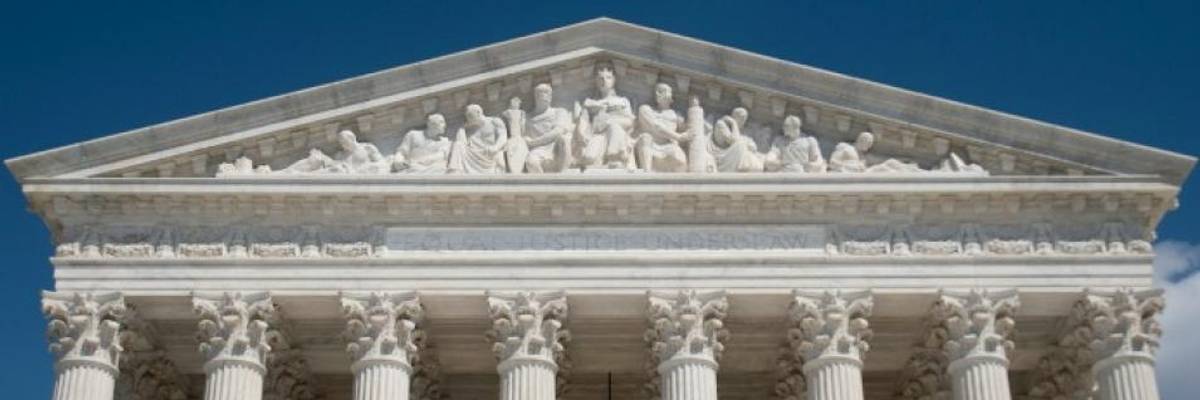
With forced arbitration agreements, "a worker who is not paid fairly, discriminated against, or sexually harassed, is forced into a process that overwhelmingly favors the employer--and forced to manage this process alone, even though these issues are rarely confined to one single worker," write EPI's Celine McNicholas. (Photo: Ron Cogswell/flickr/cc)
'Terrible News for Workers' as Supreme Court Makes It Harder for Them to Fight Back When 'Screwed' by Employer
Justice Ruth Bader Ginsburg says decision allowing forced arbitration clauses is 'egregiously wrong'
The U.S. Supreme Court on Monday dealt a blow to worker rights, saying that employers can bar their employees from banding together to challenge workplace abuses including wage theft and sexual harassment.
MSNBC host and legal analyst Ari Melber summed up the 5-4 decision (pdf) by tweeting: "Supreme Court rules that you have the right to your day in court, unless a corporation effectively makes you give up that right."
Political activist Zephyr Teachout, meanwhile, said the decision "is terrible news for workers in America," as it makes "it harder for employees to get a fair hearing when they are screwed."
When employers mandate arbitration clauses, employees must act as individuals to challenge alleged workplace abuses, and are thus barred from gaining strength in numbers through class action suits to challenge corporate power. In the cases before the high court, employers had argued they had the right to impose such contracts under the Federal Arbitration Act, while employees argued they had the right to take collective action under the National Labor Relations Act (NLRA).
Celine McNicholas, director of labor law and policy at the Economic Policy Institute (EPI), responded by explaining the real and specific impact the court's ruling will have on workers:
These agreements bar access to the courts for all types of employment-related claims, including those based on the Fair Labor Standards Act, Title VII of the Civil Rights Act, and the Family Medical Leave Act. This means that a worker who is not paid fairly, discriminated against, or sexually harassed, is forced into a process that overwhelmingly favors the employer--and forced to manage this process alone, even though these issues are rarely confined to one single worker.
Conservative Justice Neil Gorsuch wrote the majority opinion, finding that "Congress has instructed that arbitration agreements like those before us must be enforced as written." According to Steve Vladeck, a CNN contributor and professor of law at the University of Texas School of Law, "Not only is [Gorsuch] endorsing the conservative justices' controversial approach to arbitration clauses, but he's taking it an important step further by extending that reasoning to employment agreements, as well."
Justice Ruth Bader Ginsburg wrote the dissenting opinion, and read a summary of her dissent aloud--"something justices do only rarely to signify their objections," USA Today reported.
Ginsburg called the decision "egregiously wrong," and asserted: "Recognizing employees' right to engage in collective employment litigation and shielding that right from employer blockage are firmly rooted in the NLRA's design."
She further noted that made "to face their employers without company, employees ordinarily are no match for the enterprise that hires them. Employees gain strength, however, if they can deal with their employers in numbers. That is the very reason why the NLRA secures against employer interference employees' right to act in concert for their 'mutual aid or protection.'"
"The inevitable result of today's decision ," she added, "will be the under-enforcement of federal and state statutes designed to advance the well-being of vulnerable workers."
EPI's McNicholas urged Congress to take action to prevent that from happening.
"It is essential to both our democracy and a fair economy that workers have the right to engage in collective action," she stated. "Congress must act to restore this fundamental right and ban mandatory arbitration agreements and class and collective action waivers."
An Urgent Message From Our Co-Founder
Dear Common Dreams reader, The U.S. is on a fast track to authoritarianism like nothing I've ever seen. Meanwhile, corporate news outlets are utterly capitulating to Trump, twisting their coverage to avoid drawing his ire while lining up to stuff cash in his pockets. That's why I believe that Common Dreams is doing the best and most consequential reporting that we've ever done. Our small but mighty team is a progressive reporting powerhouse, covering the news every day that the corporate media never will. Our mission has always been simple: To inform. To inspire. And to ignite change for the common good. Now here's the key piece that I want all our readers to understand: None of this would be possible without your financial support. That's not just some fundraising cliche. It's the absolute and literal truth. We don't accept corporate advertising and never will. We don't have a paywall because we don't think people should be blocked from critical news based on their ability to pay. Everything we do is funded by the donations of readers like you. Will you donate now to help power the nonprofit, independent reporting of Common Dreams? Thank you for being a vital member of our community. Together, we can keep independent journalism alive when it’s needed most. - Craig Brown, Co-founder |
The U.S. Supreme Court on Monday dealt a blow to worker rights, saying that employers can bar their employees from banding together to challenge workplace abuses including wage theft and sexual harassment.
MSNBC host and legal analyst Ari Melber summed up the 5-4 decision (pdf) by tweeting: "Supreme Court rules that you have the right to your day in court, unless a corporation effectively makes you give up that right."
Political activist Zephyr Teachout, meanwhile, said the decision "is terrible news for workers in America," as it makes "it harder for employees to get a fair hearing when they are screwed."
When employers mandate arbitration clauses, employees must act as individuals to challenge alleged workplace abuses, and are thus barred from gaining strength in numbers through class action suits to challenge corporate power. In the cases before the high court, employers had argued they had the right to impose such contracts under the Federal Arbitration Act, while employees argued they had the right to take collective action under the National Labor Relations Act (NLRA).
Celine McNicholas, director of labor law and policy at the Economic Policy Institute (EPI), responded by explaining the real and specific impact the court's ruling will have on workers:
These agreements bar access to the courts for all types of employment-related claims, including those based on the Fair Labor Standards Act, Title VII of the Civil Rights Act, and the Family Medical Leave Act. This means that a worker who is not paid fairly, discriminated against, or sexually harassed, is forced into a process that overwhelmingly favors the employer--and forced to manage this process alone, even though these issues are rarely confined to one single worker.
Conservative Justice Neil Gorsuch wrote the majority opinion, finding that "Congress has instructed that arbitration agreements like those before us must be enforced as written." According to Steve Vladeck, a CNN contributor and professor of law at the University of Texas School of Law, "Not only is [Gorsuch] endorsing the conservative justices' controversial approach to arbitration clauses, but he's taking it an important step further by extending that reasoning to employment agreements, as well."
Justice Ruth Bader Ginsburg wrote the dissenting opinion, and read a summary of her dissent aloud--"something justices do only rarely to signify their objections," USA Today reported.
Ginsburg called the decision "egregiously wrong," and asserted: "Recognizing employees' right to engage in collective employment litigation and shielding that right from employer blockage are firmly rooted in the NLRA's design."
She further noted that made "to face their employers without company, employees ordinarily are no match for the enterprise that hires them. Employees gain strength, however, if they can deal with their employers in numbers. That is the very reason why the NLRA secures against employer interference employees' right to act in concert for their 'mutual aid or protection.'"
"The inevitable result of today's decision ," she added, "will be the under-enforcement of federal and state statutes designed to advance the well-being of vulnerable workers."
EPI's McNicholas urged Congress to take action to prevent that from happening.
"It is essential to both our democracy and a fair economy that workers have the right to engage in collective action," she stated. "Congress must act to restore this fundamental right and ban mandatory arbitration agreements and class and collective action waivers."
The U.S. Supreme Court on Monday dealt a blow to worker rights, saying that employers can bar their employees from banding together to challenge workplace abuses including wage theft and sexual harassment.
MSNBC host and legal analyst Ari Melber summed up the 5-4 decision (pdf) by tweeting: "Supreme Court rules that you have the right to your day in court, unless a corporation effectively makes you give up that right."
Political activist Zephyr Teachout, meanwhile, said the decision "is terrible news for workers in America," as it makes "it harder for employees to get a fair hearing when they are screwed."
When employers mandate arbitration clauses, employees must act as individuals to challenge alleged workplace abuses, and are thus barred from gaining strength in numbers through class action suits to challenge corporate power. In the cases before the high court, employers had argued they had the right to impose such contracts under the Federal Arbitration Act, while employees argued they had the right to take collective action under the National Labor Relations Act (NLRA).
Celine McNicholas, director of labor law and policy at the Economic Policy Institute (EPI), responded by explaining the real and specific impact the court's ruling will have on workers:
These agreements bar access to the courts for all types of employment-related claims, including those based on the Fair Labor Standards Act, Title VII of the Civil Rights Act, and the Family Medical Leave Act. This means that a worker who is not paid fairly, discriminated against, or sexually harassed, is forced into a process that overwhelmingly favors the employer--and forced to manage this process alone, even though these issues are rarely confined to one single worker.
Conservative Justice Neil Gorsuch wrote the majority opinion, finding that "Congress has instructed that arbitration agreements like those before us must be enforced as written." According to Steve Vladeck, a CNN contributor and professor of law at the University of Texas School of Law, "Not only is [Gorsuch] endorsing the conservative justices' controversial approach to arbitration clauses, but he's taking it an important step further by extending that reasoning to employment agreements, as well."
Justice Ruth Bader Ginsburg wrote the dissenting opinion, and read a summary of her dissent aloud--"something justices do only rarely to signify their objections," USA Today reported.
Ginsburg called the decision "egregiously wrong," and asserted: "Recognizing employees' right to engage in collective employment litigation and shielding that right from employer blockage are firmly rooted in the NLRA's design."
She further noted that made "to face their employers without company, employees ordinarily are no match for the enterprise that hires them. Employees gain strength, however, if they can deal with their employers in numbers. That is the very reason why the NLRA secures against employer interference employees' right to act in concert for their 'mutual aid or protection.'"
"The inevitable result of today's decision ," she added, "will be the under-enforcement of federal and state statutes designed to advance the well-being of vulnerable workers."
EPI's McNicholas urged Congress to take action to prevent that from happening.
"It is essential to both our democracy and a fair economy that workers have the right to engage in collective action," she stated. "Congress must act to restore this fundamental right and ban mandatory arbitration agreements and class and collective action waivers."

